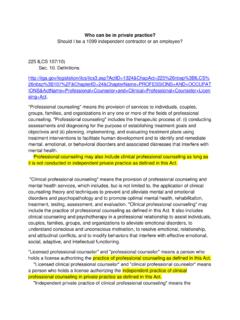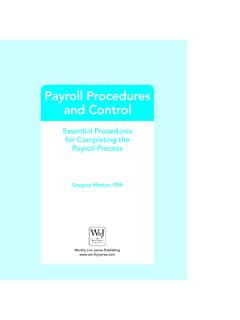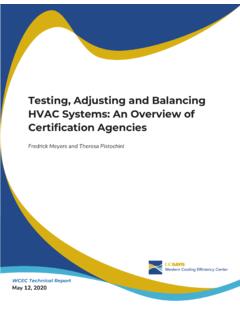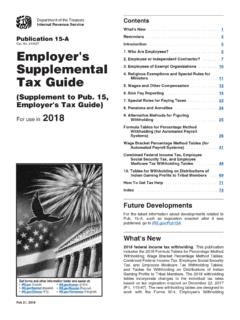Transcription of Gaming Tax Law and Bank Secrecy Act Issues - IRS tax forms
1 Gaming Tax Law and Bank Secrecy Act Issues for Indian Tribal Governments Publication 3908 (Rev. 9-2019) Catalog Number 32755Y Department of the Treasury Internal Revenue Service Gaming Tax Law and Bank Secrecy Act Issues CONTENTS. SECTION I OVERVIEW. Federal Law and Regulations .. 1. Indian Gaming Regulatory Act (IGRA). Bank Secrecy Act (BSA), Title 31 of the Code of Federal Regulations Section 352 of the USA PATRIOT Act of 2001. Federal Agency Partners .. 2. Department of the Interior/Bureau of Indian Affairs National Indian Gaming Commission (NIGC). Financial Crimes Enforcement Network (FinCEN). Office of Foreign Assets Control (OFAC). Determining Federal Tax Status of Indian Tribal Governments .. 3. SECTION II RECORDKEEPING AND REPORTING. The Tribe's Legal Responsibilities .. 4. Bank Secrecy Act .. 4. Casino Definition Recordkeeping Requirements Anti-Money Laundering Compliance Programs (AML). Suspicious Transactions Structuring Currency Transaction Reporting Domestic and Foreign Vendors SECTION III DISTRIBUTIONS FROM Gaming REVENUE.
2 Per Capita 10. Guidelines for Per Capita Distribution Plans .. 10. Gaming Distributions to 10. Withholding Requirements of Distributions from Net Gaming Revenue .. 11. SECTION IV EMPLOYMENT TAX = PAYROLL TAX. Employment Tax ..12. Reporting Tip Income .. 13. Tip Rate Determination/Education Program (TRD/EP) .. 14. independent Contractor vs. Employee .. 14. How to Make Federal Tax Payments .. 15. Employment Tax Penalties .. 17. Gaming Tax Law and Bank Secrecy Act Issues SECTION V TAX ON WAGERING. Wagering Excise Tax ..18. Occupational Tax ..19. SECTION VI FILING REQUIREMENTS. Summary Filing Requirements for Tribal Gaming Operations .. 21. IRS Tax forms to File for Gaming Activities ..22. Reporting and Withholding Gaming Winnings ..23. Verifying Residency .. 28. FIRE .. 29. Gaming Withholding and Reporting Threshold forms Needed .. 30. Gaming Guidelines When to Withhold and Report Gaming Wins .. 31. SECTION VII RESOURCES AND ASSISTANCE.
3 Tax Information Materials .. 32. Reporting 32. Customer Service Assistance .. 32. Gaming Tax Law and Bank Secrecy Act Issues SECTION I OVERVIEW. All tribal governments conducting or sponsoring Gaming activities must understand and comply with federal requirements on income tax reporting, employment tax and excise tax. The requirements apply to Gaming activities whether they take place one time or throughout the year, and whether in their primary place of operation or at remote sites. The Indian Gaming Regulatory Act divides Gaming activities into three classes: Class I consists of social games that have prizes of minimal value and traditional tribal games played in connection with tribal ceremonies or celebrations. Class II primarily includes bingo (whether or not it is electronically enhanced), pull-tabs, lotto, punch boards, tip jars, instant bingo, games similar to bingo and non-banking card games allowed by state law.
4 Class III Gaming includes all Gaming that is not Class I or Class II Gaming , primarily slot machines, casino games, banking card games, dog racing, horse racing and lotteries. This Internal Revenue Service (IRS) publication provides you with the tax law on Gaming operations for these activities. You'll learn about recordkeeping, employment tax, tax on wagering, per capita distributions, forms to file and more. You can download or order all IRS forms and publications mentioned in this publication at Visit for information for Indian Tribal Governments (ITG). For more information on Gaming tax law, you can contact your ITG specialist or the ITG group manager in your area (see Section VII). For Customer Account Services, call 877-829-5500. Federal Law and Regulations Indian Gaming Regulatory Act (IGRA). Since IGRA's passage in 1988, tribes and states have successfully negotiated hundreds of Tribal-state Gaming compacts.
5 Gaming provides significant revenues for many Indian tribes. Highlights of IGRA include: Provides a statutory basis for the regulation of Indian Gaming to ensure that tribes are the primary beneficiaries Establishes federal standards for Indian Gaming Shields Gaming from organized crime and other corrupting influences Ensures that the operators and players conduct Gaming fairly and honestly Provides a statutory basis for the operation of Gaming by Indian tribes to promote tribal economic development, self-sufficiency and strong tribal governments Establishes the National Indian Gaming Commission (NIGC). independent federal regulatory authority for Indian Gaming Meets congressional concerns about Indian Gaming and protects Gaming as a means of generating tribal revenue 1. Gaming Tax Law and Bank Secrecy Act Issues Bank Secrecy Act (BSA), Title 31 of the Code of Federal Regulations Casinos are cash intensive businesses that can offer a broad array of financial services, such as: Deposit or credit accounts Facilities for transmitting and receiving funds transfers directly from other institutions Check cashing and currency exchange services Since these services are similar to those provided by depository institutions and other financial firms, casinos are vulnerable to abuse by money launderers and tax evaders.
6 Highlights of the BSA include: Provides rules and regulations on reporting currency transactions greater than $10,000. Provides rules and regulations on identification and recordkeeping requirements Creates an audit trail to help minimize illegal financial transactions Covers casinos with gross annual Gaming revenue exceeding $1,000,000. Extends coverage to Indian casino operations in August 1996 and card clubs in August 1998. Section 352 of the USA PATRIOT Act of 2001. Section 352 of the USA PATRIOT Act of 2001 requires financial institutions to establish anti-money laundering programs. Casinos and card clubs comply with this requirement if they implement and maintain adequate programs for compliance with the Bank Secrecy Act. See the United States Code, Title 31, Section 5318(h). Federal Agency Partners Department of the Interior/Bureau of Indian Affairs Through its relationships with the Bureau of Indian Affairs and the National Indian Gaming Commission, the Department of the Interior has approval responsibility for various reservation and tribal Issues .
7 This includes overseeing revenue allocation plans associated with Indian Gaming . The Bureau of Indian Affairs provides services directly or through contracts, grants or compacts to the federally recognized tribes with a service population of about million American Indian and Alaska Natives. National Indian Gaming Commission (NIGC). The NIGC oversees Indian Gaming . Its primary mission is to regulate Gaming activities conducted by tribes on Indian lands. NIGC's goals are: Promoting tribal economic development, self-sufficiency and strong tribal governments;. Maintaining the integrity of the Indian Gaming industry; and Ensuring that tribes are the primary beneficiaries of their Gaming activities. Financial Crimes Enforcement Network (FinCEN). The Department of the Treasury established the Financial Crimes Enforcement Network to provide a government-wide multisource financial intelligence and analysis network. The organization's operation was broadened in 1994 to include regulatory responsibilities for administering the Bank Secrecy Act.
8 2. Gaming Tax Law and Bank Secrecy Act Issues Office of Foreign Assets Control (OFAC). The Office of Foreign Assets Control of the Department of the Treasury administers and enforces economic and trade sanctions against targeted foreign countries and regimes, terrorists, international narcotics traffickers, those engaged in activities related to the proliferation of weapons of mass destruction, and other threats to the national security, foreign policy or economy of the United States. Determining Federal Tax Status of Indian Tribal Governments While the NIGC is responsible for overseeing Indian Gaming , the IRS is responsible for federal taxation Issues on Gaming . The IRS is also responsible for any other federal tax Issues involving Indian tribal governments. Due to Gaming compacts negotiated between the tribes and states, other types of regulations exist that involve state oversight. Ultimately, the IRS interprets federal tax law on tribal entities and enterprises.
9 Even though Indian tribes are not subject to federal income tax, an individual tribal member not exempt from income taxation must report gross income amounts distributed or constructively In tribal Gaming , structure and ownership of a Gaming operation has a significant impact on the taxability of the income. Example 1: A tribe may operate unincorporated businesses in or away from Indian country. The income derived is not subject to federal income tax. If the tribe decides to incorporate its business, income may be subjected to tax based on how the corporation is formed. Example 2: A tribe may incorporate under the Indian Reorganization Act of 1934. This type of corporation isn't subject to income tax regardless of where the business is located. An approval article or certificate signed by the Secretary of the Interior is evidence of incorporation under the Indian Reorganization Act. Example 3: An Indian tribe located in Oklahoma is not eligible to incorporate under the Indian Reorganization Act.
10 Instead, an Oklahoma tribe may incorporate under the Oklahoma Indian Welfare Act. This type of corporation is not subject to income tax regardless of where the business is located. An approval article or certification signed by the Secretary of the Interior is evidence of incorporation under the Oklahoma Indian Welfare Act. Example 4: An Indian tribe may also form a corporation under state law. This type of corporation is ordinarily subject to federal income tax on income earned on or after October 1, 1994, regardless of where the business is located. Because the state charter creates an entity separate and distinct from the tribe, the federal income tax applies to this new entity. A state issued certification of incorporation is evidence of incorporation under state law. 1. Constructively received means you are generally taxed on income that is available to you, regardless of whether it is actually in your possession.
















